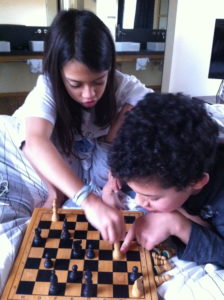
Last week I was reading an article from the Harvard Business Review by Heidi Grant Halvorson curiously entitled: The Trouble with Bright kids.
I enjoyed the ‘takeaway’ from the article, which I quickly shared with my own children Ivan (11) and Natasha (8). The short of it is that kids who believe that their success is due to them being smart, tend to perform worse, when facing challenging problems, then kids who believe that they succeed because they work hard. This was demonstrated through experiments with children in a classroom environment.
I can see the importance of this as I have often come across very intelligent people who are limited in their abilities because they fear being ‘caught out’. They are either afraid of appearing less smart then they think they are or of damaging their public reputation.
Soft and hard paradigms
In the hyperthinking system, I further develop this notion as part of the problem adults encounter as they grow older. Their preconceptions, prejudice and preconceived ideas become more entrenched. I call this a ‘hard paradigm’, when the paradigm we use to understand the world becomes increasingly rigid and changing it can be a genuine problem. Children, on the other hand, start off with ‘soft paradigms’, that only become harder as time passes and their confidence in their own abilities is strengthened. This is particularly visible with languages and technology when comparing how adults face learning in contrast to children.
These fields are often perceived as incredibly challenging, and some adults form the conclusion that they are simply ‘not equipped or gifted’ to acquire these skills. Children, on the other hand, have no such reservation and will always pick up new languages if sufficiently immersed in the environment it is spoken – the younger the easier it seems. With technology (computers), children again have no fear or resistance when learning how to engage with these devices that sometimes have a deeply off putting quality for adults. They play, they try, and the ‘thing’ responds. This provides them with an endless source of entertainment and by playing, they learn.
The difference, in my mind, is that adults have ingrained preconceptions of what they ‘should’ know and what their abilities are. Once they feel they are struggling with a new mental skill, there is a natural inclination to give up early. Especially when the learning might reveal how little they know about their field of endeavour. We don’t believe it is about hard work – or ‘hard play’ as some children see it. When faced with a new language, children learn best when they simply try through repetition or trial and error. Adults on the other hand tend to over analyze the language, try to fit it in an existing paradigm and struggle to make this work. This is (in part) why learning things that seem to come effortlessly to kids are a massive struggle for us, grown-ups.
The lessons from the HBR article (and other articles by the same author) is that almost any mental skill can be learned. Provided we allocate time, effort and practice to develop that skill. Second, our own perceptions about our abilities can be a hindrance to our learning, thinking of ourselves as smart can limit our capacity to learn and embrace challenges. Instead of thinking of ourselves as smart (even if we are), we need to believe in our ability to ‘work the problem’. We should relish spending time and energy trying to solve problems and make it one of our core skills.
Cross-posted from http://www.hyperthinker.eu/2011/soft-paradigms-and-bright-kids/











